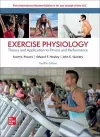
Exercise Physiology: Theory and Application for Fitness and Performance ISE
3 authors - Paperback
£59.99
Scott K. Powers is a Distinguished Professor and the UAA Endowed professor in the Department of Applied Physiology and Kinesiology at the University of Florida. Powers enjoys teaching and has earned three University of Florida teaching awards. Dr. Powers research has focused on exercise-mediated changes in cardiac and skeletal muscle antioxidant systems and the role that these changes play in providing protection against oxidant injury. Further, he is actively investigating the mechanisms responsible for respiratory muscle weakness in patients subjected to prolonged periods of mechanical ventilation. Dr. Powers laboratory work has been funded by grants totaling more than five million dollars from the National Institutes of Health, American Heart Association, American Lung Association, and the Florida Biomedical Research Program. This research has resulted in over 180 peer-reviewed research publications. Scott has also co-authored four college textbooks for use in exercise physiology and fitness courses. Powers is active in both the American Physiological Society and the American College of Sports Medicine. He also serves as an Associate Editor for the American Journal of Physiology-Reg. and is a member of the editorial board for the Journal of Applied Physiology, the International Journal of Sports Medicine, and the International Journal of Sport Nutrition and Exercise Metabolism. Scott Powers received his bachelors degree in physical education from Carson Newman College, his masters degree in exercise physiology from the University of Georgia, and a doctorate (EdD) in exercise physiology from the University of Tennessee. Powers earned a second doctoral degree (PhD) in physiology from Louisiana State University. Edward Howley received his BS degree from Manhattan College and his MS and PhD degrees from The University of Wisconsin, Madison. He completed a one-year post-doctoral appointment at Penn State University and began his career at the University of Tennessee in 1970. He taught a variety of courses in physiology, exercise physiology and fitness testing and prescription over 36 years. He also served as an administrator of the Exercise Science program/department. He retired in 2007 and holds the rank of professor emeritus. He has received several awards for his teaching. Most of Dr. Howleys volunteer efforts have been with the American College of Sports Medicine, where he served as president from 20022003. He is the Editor-in-Chief of ACSMs Health & Fitness Journal, and is chair of the program planning committee for the annual ACSM Health & Fitness Summit meeting. John Quindry is a Professor, Chair, and International Heart Institute Research Fellow at the University of Montana, Missoula MT. Quindry has an educational background in exercise physiology (BS, MS at Illinois State University) and a PhD in Biomedical Sciences (emphasis: Physiology) from the Quillen College of Medicine as East Tennessee State University. Quindry also completed an NIH-funded postdoctoral fellowship in Exercise Biochemistry and Cardioprotection at the University of Florida under Scott Powers mentorship. Quindrys teaching emphasis calls upon his experience as a clinical exercise physiologist, in addition to animal- and human-based research in the area of cardiovascular health and the prevention of chronic diseases. Quindrys Cardio protection research laboratory at the University of Montana has been funded by a host of federal grants in addition to foundations focused on the treatment and prevention of life threatening diseases. Quindry, his student trainees, and collaborators have produced over 100 original science research papers and review publications. John has served as an Associate Editor for Medicine and Science in Sports and Exercise since 2013 and remains very active in the American College of Sports Medicine and the American Physiological Society. Quindry has a passion for teaching clinical and exercise physiology to budding health/fitness/wellness professionals in addition to future professionals in the areas of health and allied health.